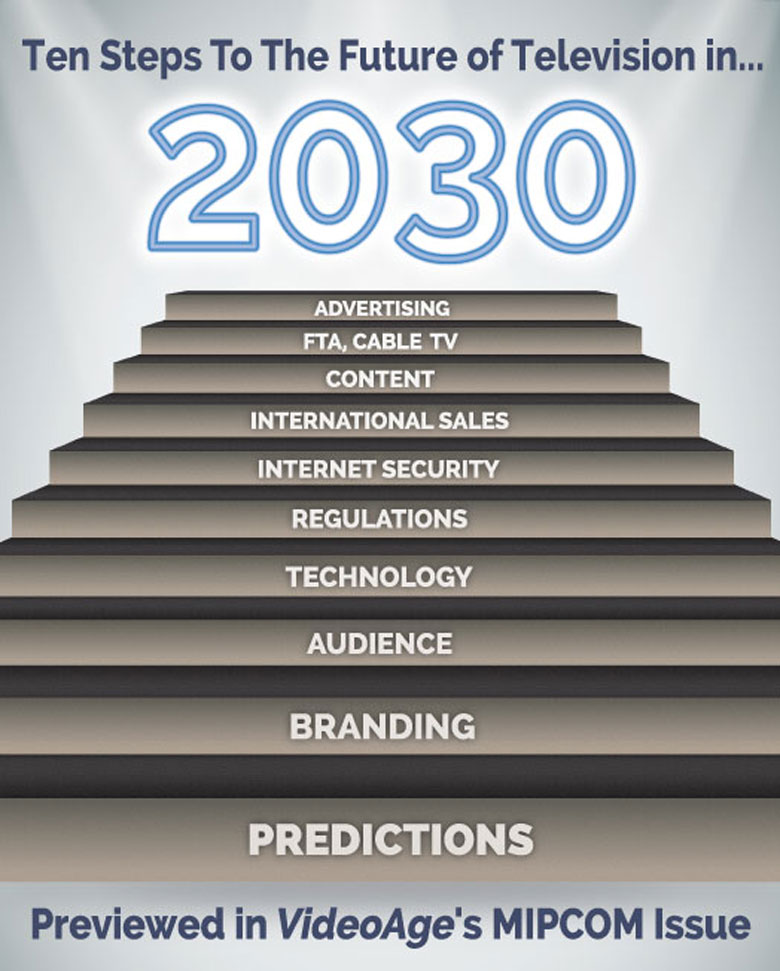The future is coming like a German Panzer, but for some strange reason, few seem ready for it or ready to evolve with it. Indeed, no one can prevent it, and we never know when it will come. That said, the future can come in handy even before it arrives. When there’s uncertainty about what to do, thinking about the future could bring an immediate solution.
With the 10 forthcoming predictions (revealed in print and in this edition’s PDF version), VideoAge analyzes every level of a 10-step staircase leading to the future of television: Free broadcast and cable TV, advertising, Internet and broadband, content, international content sales, regulations, technology, audience, branding and finally, the predictions themselves.
History is full of miscalculated predictions made by experts and visionaries: “Man will never reach the moon, regardless of all future scientific advances,” Lee DeForest, one of the inventors of television, said in 1967. “There is a world market for maybe five computers,” Thomas Watson, chairman of IBM, said in 1943.
Over the years, prediction periods got shorter — those made in the 1800s span some 100 years, while in the 1990s they were limited to 50 years, in the early 2000s they were 25 years, and now they’re just 15 years — because of fast technological changes.
These 10 steps also distinguish between “predictions” and “forecasts,” wherein the former are long-term (15 years) and based on beliefs, and the latter are short-term (five years) and based on analysis and statistics. Some of the topics, all interrelated like the steps of a staircase, are listed below along with the authors of the predictions.
Len Grossi:
Where will content production money come from?
Will we return to sponsored and branded content as in the early years of commercial television?
What will the role of public television production be? Will the back-end still exist?
Will theatrical release still exist?
Will production costs increase or decrease?
Where will producers be coming from?
Ettore Botta:
Will international sales of content be conducted solely online? What will the future of trade shows and conferences be?
Are virtual trade shows a thing of the past or the future?
Q&A with Blair Westlake:
What will happen to FTA television?
Will cable TV become just a fat “pipe” for broadband, with content being transported via IPTV? Will there be such a thing as free TV anymore?
With increased poverty levels, why would “free” TV lose out? Will FTA depend on live events?
Is the future of localism (emergencies and local news) tied to FTA? Is linear television a thing of the past?
Will TV stations continue to utilize over-the-air spectrum?
Q&A with Barry Frey:
Will TV advertising fully migrate to
online video?
Will the critical mass only be obtained by aggregating web media? Will advertisers still need the critical mass?
What will the role of ad agencies be?
What will happen when media inventory greatly surpasses demand? Will media advertising change the retail business?
Do you predict today’s unforeseen events in advertising?
Interview with Jon E. Currie: In 2030 will audiences still reach critical masses?
Will critical mass die with linear television?
If critical masses are still reached, how will these critical masses be achieved (e.g., time- shifted L7)?
In a pull video environment (Vs. the traditional push TV services), when will the critical mass be declared (in a week, like the current L7; in a month)?
Will the rise of VoD in its various forms (e.g., SVoD, TVoD, FVoD, PVoD, etc.) change the nature of the audience to deliver to advertisers?
Will niche television increase fragmentation or reduce it?
Will Internet interactivity eliminate the need for rating services?
In 2030, will demographics still count or will psychographics be the norm (with demographic, viewers could have the same income, but different lifestyles and education)?
Luca F. Cadura:
Will branding continue to be queen?
In the past, viewers watched content and not channels, later they looked at the brand, which became queen to content’s king.
What will the role of brands be?
In a sea of brands, which ones will emerge?
What will be the threshold to be declared a brand (e.g., can 100,000 consumers make a brand)?
Steve Schiffman:
Will regulations be necessary or even enforceable?
Can content be regulated for obscenity, violence and security? Can regulations still generate technical and moral standards?
Edoardo Fleischner:
What is the next media that technology will render obsolete?
What is technology promising?
After the demise of records, cassettes (both audio and video), super 8-mm film and DVD, what will disappear next (aside from the expected doomed print media)?
Will 3D be a reality after 8K TV?
How will data be stored and old digital data retrieved?
Interview with Michael Liebhold:
Technology alone will not solve the Internet security problem. Is it possible that ICANN will get involved and create Internet zones that are not automatically interconnected? (In this case, a Russian or Chinese user would have to ask permission to reach a user in another zone).
Is there a secure way to prevent online wars?
Will the Internet become standardized and compatible? (Meaning that older systems will be able to work with new systems and vice-versa). Radio and TV sets built in the ’40s still work today.
Will a combination of more pipes and better compression make broadband sufficient for the growing Internet traffic?
Will broadband still be based on a subscription model?
Will the Internet be protected from nuclear electromagnetic pulses?
Dom Serafini:
How accurate can predictions be? In 1860 experts predicted the demise of NYC due to the large amount of horse manure, which was a problem in that era.
Are today’s experts also using current parameters to wrongly predict the future?
Audio Version (a DV Works service)











Leave A Comment